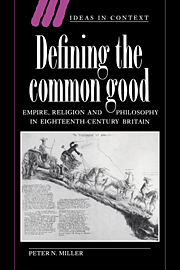Book contents
Conclusion
Published online by Cambridge University Press: 23 October 2009
Summary
The post–Reformation state, a political entity characterized by the need to keep joined necessity and morality in the formulation of policy and the practice of governing disparate political communities only recently united under a single head, did not die in 1776. Not in Britain and not on the Continent. But the revolutionary epoch that began in the 1770s and continued for the next fifty years does, indeed, mark the end of its creative, vital period. The profusion of a literature on the ‘reason’ of state accompanied the appearance in the sixteenth century of these powerful new entities which have, therefore, usually been assigned a causal role in its generation. But the problem of necessity preceded the early modern state by several thousand years. What changed was the emphasis on a certain aspect of politics, one which, I have argued, was intimately linked with the needs of post–Reformation states. With the focus on the competing claims of public and private utility Cicero returned to a new kind of prominence, no longer as the teacher of rectitude held up by the Church Fathers, nor the republican hero of the Quattrocento, but as the teacher of a moral prudence to be distinguished from the purely calculating Tacitean variety prevalent at this time. It was believed that the causes of conflict could be resolved by demonstrating that social life was itself impossible without the voluntary subordination of private aims to the claims of public utility. Individual self-preservation and, by extension, the preservation of the political communities which secured the lives of their inhabitants became the touchstone of political practice and its theoretical justifications.
- Type
- Chapter
- Information
- Defining the Common GoodEmpire, Religion and Philosophy in Eighteenth-Century Britain, pp. 413 - 421Publisher: Cambridge University PressPrint publication year: 1994



